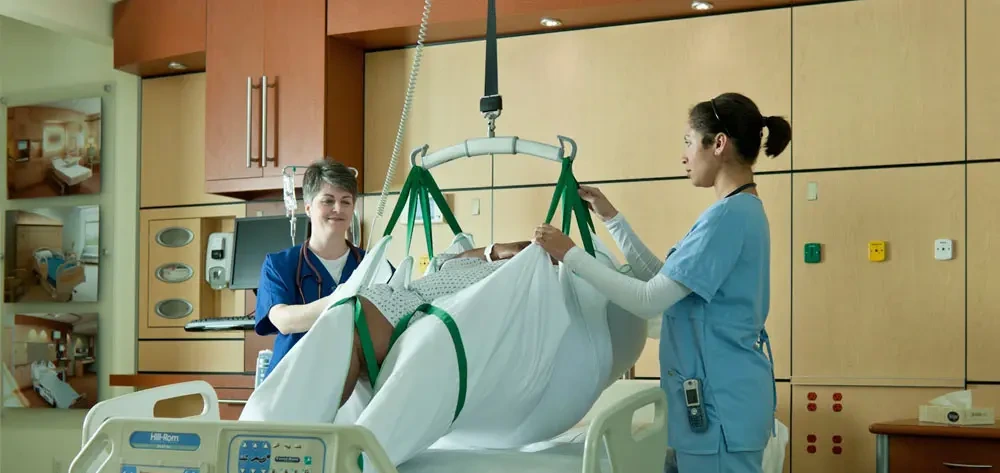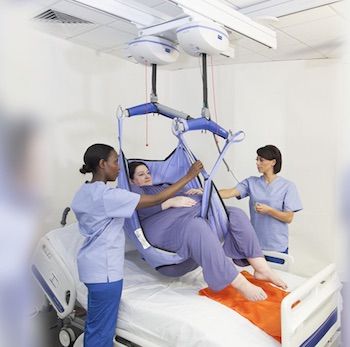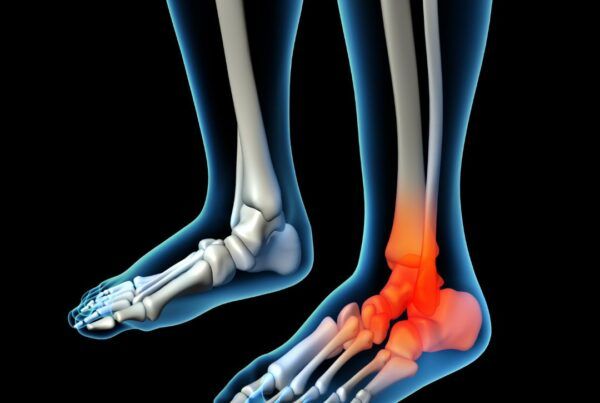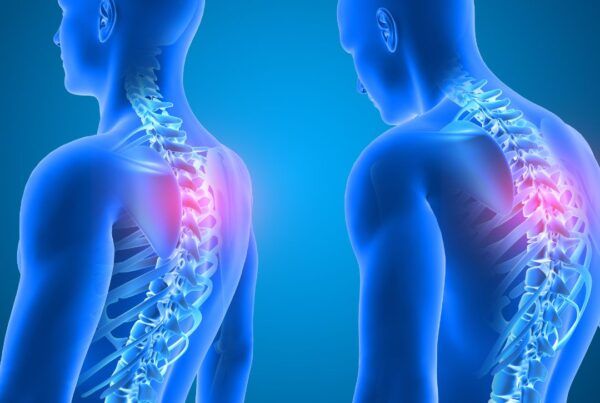OFI is thrilled to announce the expansion of our training services, introducing cutting-edge solutions for bariatric patient moving and handling. With over 35 years of industry expertise, our experience working with clients across countless different sectors has prepared us to broaden our services by diving into the realm of bariatrics. Formulated by some of the UK’s most experienced bariatric patient moving and handling specialists, our mission is to empower you and your team with the skills and knowledge required to deliver exceptional care to patients of larger sizes.
In the landscape of healthcare, the challenges associated with bariatric patient handling are not only complex but also governed by a set of stringent legal and ethical considerations. Failing to adhere to these laws and behaviours can result in legal liabilities and ethical dilemmas for healthcare professionals.
This article aims to provide a comprehensive exploration of the legal and ethical considerations that are attached to bariatric patient handling in the UK, shedding light on key regulations, standards of care, and ethical principles that guide healthcare practices.
Legal Considerations in Bariatric Patient Handling
Negligence and Malpractice
In the UK, healthcare providers must be acutely aware of the legal consequences associated with negligence in bariatric patient handling. Failure to adhere to established protocols can lead to patient harm, resulting in potential lawsuits and financial penalties. Therefore, it is imperative for healthcare professionals to follow rigorous guidelines to minimise the risk of negligence and malpractice.
Informed Consent in Bariatric Patient Handling: Legal and Ethical Significance
The legal and ethical significance of obtaining informed consent in bariatric patient handling cannot be overstated. In the UK, this practice is not just a recommended ethical standard but a legal requirement for any medical procedure or intervention. It plays a crucial role in protecting healthcare providers legally and upholding the principles of patient autonomy, transparency, and trust.
Several aspects highlight the importance of informed consent in bariatric patient handling:
1. Legal Protection for Healthcare Providers
Obtaining informed consent provides a vital layer of legal protection for healthcare providers. Documented evidence of informed consent demonstrates that the patient was aware of the risks involved in bariatric handling procedures and agreed to proceed, offering a defence against potential legal liabilities.
2. Autonomy and Patient Empowerment
Respecting a patient’s autonomy is a fundamental ethical principle. By involving bariatric patients in the decision-making process through informed consent, healthcare providers empower them to actively participate in their own care, fostering a patient-centred approach.
3. Transparency and Trust Building
Informed consent creates transparent and trusting relationships between healthcare providers and patients. It reflects a commitment to open communication, honesty, and respect for the patient’s right to understand and make informed decisions about their care.
4. Education and Understanding
Bariatric patients may face unique health considerations and mobility challenges. Providing detailed information about the handling process ensures that patients are well-informed, reducing anxiety and improving cooperation during the procedure.
5. Risk Assessment and Mitigation
Informed consent necessitates communication of potential risks associated with bariatric patient handling, encouraging a thorough risk assessment. This, in turn, allows healthcare providers to implement appropriate precautions and choose the safest handling techniques.
6. Legal Standard of Care
In the UK, obtaining informed consent is considered a standard of care. Failure to do so may be viewed as a deviation from this standard, potentially leading to legal consequences in cases of adverse outcomes.
7. Ethical Considerations for Dignity and Respect
Respecting the dignity and autonomy of bariatric patients involves ensuring they are fully informed about their care, reinforcing the principle of patient-centred care.
8. Ethical Obligations for Non-Maleficence and Beneficence
By providing detailed information and obtaining informed consent, healthcare providers fulfil their ethical duty to prevent harm (non-maleficence) and promote the patient’s wellbeing (beneficence) during bariatric patient handling.
In conclusion, informed consent is not only a legal requirement but also a crucial ethical practice in bariatric patient handling in the UK. It upholds principles of patient autonomy, trust, and transparency while also providing legal protection for healthcare providers.
Standards of Care and Regulatory Compliance in the UK
Healthcare providers in the UK are expected to adhere to established standards of care when handling bariatric patients. Deviating from these standards can present grounds for legal action. Additionally, regulatory compliance is crucial to ensure the safety and wellbeing of both healthcare providers and bariatric patients.
Key regulations and regulatory bodies for bariatric patient handling in the UK include:
1. Health and Safety Executive (HSE)
The HSE, the UK government agency responsible for regulating health and safety in the workplace, provides guidelines and resources related to manual handling, including handling bariatric patients. This includes recommendations for the use of mechanical aids and proper training.
2. Manual Handling Operations Regulations 1992
These regulations set out legal requirements for the safe handling of loads, including patients. Employers are obligated to conduct risk assessments for manual handling tasks, provide training, and implement measures to minimise the risk of injury.
3. Management of Health and Safety at Work Regulations 1999
These regulations require employers to assess and manage risks to the health and safety of their employees, including those arising from manual handling tasks, including the handling of bariatric patients.
4. Personal Protective Equipment (PPE) Regulations
Employers must provide appropriate PPE to staff involved in patient handling tasks to ensure both staff and patient safety.
5. Health and Care Professions Council (HCPC)
The HCPC regulates health and care professionals in the UK, setting standards for professional conduct and practice, including safe patient handling.
6. Care Quality Commission (CQC)
The CQC, the independent regulator of health and social care services in England, assesses and rates healthcare providers based on their compliance with regulatory standards, including patient handling practices.
7. National Institute for Health and Care Excellence (NICE)
NICE provides evidence-based guidelines and recommendations for healthcare practices, offering guidance on moving and handling legislation.
8. British Standards Institution (BSI)
The BSI develops and publishes standards that guide best practices in various industries, including patient handling.
9. National Back Exchange (NBE)
The NBE, a professional organisation focused on promoting the exchange of information and expertise in patient handling, provides resources, training, and best practice guidelines for bariatric care.
Ethical Considerations in Bariatric Patient Handling
Ethical considerations are just as important as legal compliance when moving and handling bariatric patients. These considerations include:
- Autonomy and Dignity – Respecting patient autonomy and dignity is a fundamental ethical principle. This involves ensuring that bariatric patients are treated with respect, sensitivity, and without any form of discrimination or stigmatisation.
- Beneficence and Non-Maleficence – Healthcare providers have an ethical duty to act in the best interest of the patient (beneficence) while avoiding harm (non-maleficence). This applies to all aspects of care, including handling bariatric patients.
- Cultural Sensitivity – Understanding and respecting the cultural beliefs, practices, and preferences of bariatric patients is essential. This may include considerations related to modesty, body image, and dietary restrictions.
- Truthfulness and Transparency – Providing accurate information about the risks and advantages of proper patient handling procedures is crucial. Being transparent about the challenges and potential complications ensures informed decision-making.
- Advocacy for Patient Safety – Healthcare providers have an ethical duty to advocate for the safety and wellbeing of their patients. This includes supporting the use of proper equipment and techniques for bariatric patient handling.
- Confidentiality – Protecting patient confidentiality is a critical ethical obligation. This extends to all aspects of care, including handling bariatric patients, to maintain trust and privacy.
- Crisis and Emergency Situations – Ethical decision-making becomes particularly crucial in emergencies involving bariatric patients. Providers must balance the situation’s urgency with the need to ensure patient safety and dignity.
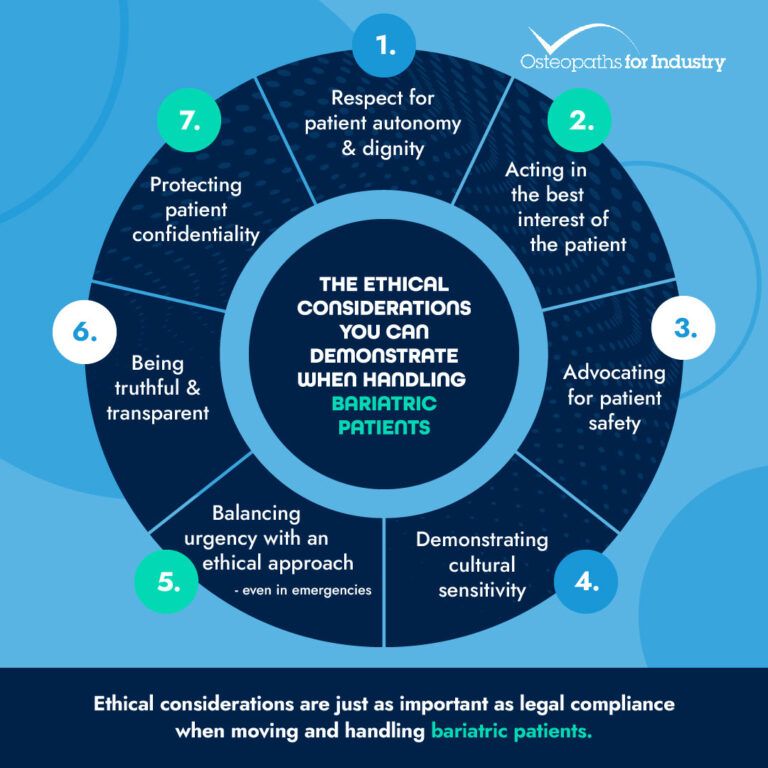
Understanding and adhering to these legal and ethical considerations is essential for healthcare providers involved in caring for bariatric patients in the UK. It not only protects both patients and providers legally but also upholds the principles of ethical healthcare delivery.
In Summary
In conclusion, the legal and ethical considerations in bariatric patient handling form a comprehensive framework that guides healthcare practices in the UK. From obtaining informed consent to adhering to regulatory standards and documenting care, healthcare providers must navigate this terrain with precision and compassion. By prioritising patient safety, autonomy, and dignity, healthcare professionals contribute to a healthcare landscape that is not only legally compliant but ethically sound.
At OFI, we play a vital role in ensuring that healthcare professionals are well-equipped to meet the challenges of bariatric patient handling, cultivating a culture of safety, respect, and excellence in patient care.


